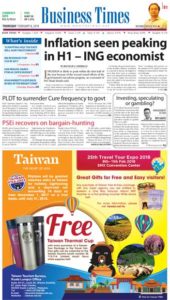MANILA: ECONOMY – ‘Inflation seen peaking in H1 – ING economist’ | Thursday, February 08, 2018
INFLATION is likely to peak within the first half of the year becuase of the second round effects of the government’s tax reform program, an economist of ING Bank Manila said.
Senior economist Joey Cuyegkeng said ING Bank Manila revised upward its inflation forecast for this year to 4 percent from an earlier projection of 3.7 percent to take into account the higher inflation rate in January.
On Tuesday, the government reported that headline inflation accelerated to 4 percent in January, the highest in more than three years, as consumer prices were impacted by the first round of tax reform. Higher fuel and food prices also added to the upward pressure on inflation.
“I think within the first half of the year, we are going to see it peak once we get the second round effects of Train,” Cuyegkeng told reporters on the sidelines of ING Bank’s economic briefing for clients held in Makati City on Wednesday.
The Train law, or Tax Reform for Acceleration and Inclusion, was implemented at the start of the year. The law reduced personal income tax rates but raised the excise taxes on fuel, coal and automobiles and imposed an excise tax on sugar sweetened beverages.
“We expect Train’s second round effects to happen maybe in the next three months. It depends on how much regulators will allow it,” Cuyegkeng added.
Taking into account the higher inflation rate in January, the ING Bank economist also revised his projection for an increase in the key rates of the Bangko Sentral ng Pilipinas (BSP) this year to 75 basis points from 50 basis points originally.
He said the rate hike may start as early as February or March instead of his earlier projection of May.
“[The rate hikes will be implemented] to anchor inflation expectations and remove the anxiety of the markets,” Cuyegkeng said.
After lowering its reverse repurchase rate to 3 percent from 4 percent on May 16, 2016 in the run-up to adopting an interest rate corridor system on June 3, 2016, the BSP kept the policy rate unchanged at its December 14, 2017 meeting.
The overnight reverse repurchase, overnight lending and overnight deposit rates have also been maintained at 3 percent, 3.5 percent, and 2.5 percent, respectively, while the reserve requirement ratio remains at 20 percent.
At its last meeting, the central bank retained its consumer price growth forecasts for this year and 2019 at 3.4 percent and 3.2 percent, respectively.
The BSP has said that inflation, along with the first round price impact of the Train law, will be a primary consideration at the Monetary Board’s first policy meeting for 2018 today, Thursday.
COURTESY:
BUSINESS TIMES
BY MAYVELIN U. CARABALLO, TMT
ON
.
NOTE : All photographs, news, editorials, opinions, information, data, others have been taken from the Internet ..aseanews.net | [email protected] |
For comments, Email to :
Pahulu Gan – Contributor | [email protected]










